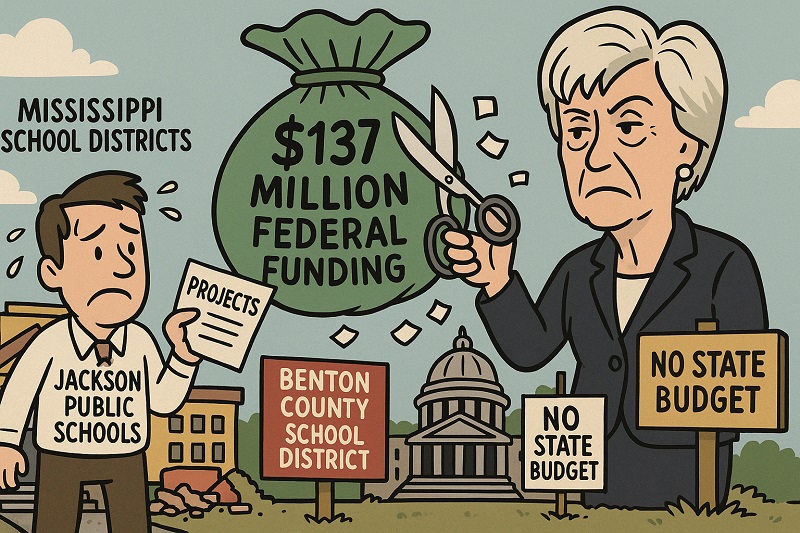Mississippi Today
Mississippi House approves mobile sports betting law


The state House on Thursday approved legislation to legalize mobile sports betting, putting Mississippi on track to join a growing number of states to legalize a form of remote gaming.
The measure passed the GOP-controlled House by 97-14, and it now heads to a Senate committee for consideration before becoming law.
House Gaming Committee Chairman Casey Eure, R-Saucier, said Mississippi could significantly reduce the number of illegal bets cast in the state if the Legislature enacts a legal remote betting program.
“It’s estimated that $64 billion was wagered on illegal sports bets across the United States last calendar year,” Eure said. “Mississippi makes up 5% of that market, which is $3 billion.”
Under the proposal, bettors would not have to physically visit a casino to register for sports betting. The entire registration process could happen remotely, as long as it was done in Mississippi.
In-person sports wagering and mobile fantasy sports have been legal in the state since 2018, but online betting has remained outlawed over worries the practice could erode casinos’ profits.
The House proposal would require online sportsbooks like DraftKings or FanDuel, called a “skin” or “platform,” to partner with a physical casino in Mississippi before allowing customers to participate in mobile betting. Betters, no matter where in the state they’re located, could choose which casino to use to place a bet.
The bill limits casinos to only partnering with one sportsbook platform, but platforms can partner with multiple Mississippi casinos simultaneously. Mississippi currently has 26 casinos, and Eure estimated that around 30 sportsbook companies exist.
Rep. Robert Johnson III, a Democrat from Natchez, raised concerns that smaller casinos such as Magnolia Bluffs in his district would face difficulties seeking a lucrative deal from platforms because larger casinos, such as the Beau Rivage Resort and Casino on the Coast, would have more leverage to negotiate a beneficial business deal.
Johnson, the House minority leader, aimed to protect the smaller casino markets by offering an amendment requiring casinos to receive profits from mobile wagers made within 40 miles of the casino, but Republicans defeated his efforts.
“I have a responsibility to make sure that I protect the jobs and the opportunities that are available in my community,” Johnson said.
The measure enacts a 12% tax on sports wagers. The proceeds from the tax will go toward repairing roads and bridges owned by counties and municipalities throughout the state.
A previous version of the proposal enacted a 12% tax on bets, but 4% of the proceeds went toward the county of the casino and 8% went to the state. But Eure, the bill’s author changed the tax structure to assuage concerns from lawmakers representing areas without casinos.
Eure, the bill’s author, estimated that Mississippi would generate between $25 million to $35 million in revenue during the first year if the state enacted a mobile sports betting program.
The House measure will now likely head to the Senate Gaming Committee for consideration. Eure said he is actively communicating with Senate leaders about the legislation, who have until April 2 to pass the measure out of a committee.
This article first appeared on Mississippi Today and is republished here under a Creative Commons license.![]()
Mississippi Today
Speaker White wants Christmas tree projects bill included in special legislative session

House Speaker Jason White sent a terse letter to Lt. Gov. Delbert Hosemann on Thursday, saying House leaders are frustrated with Senate leaders refusing to discuss a “Christmas tree” bill spending millions on special projects across the state.
The letter signals the two Republican leaders remain far apart on setting an overall $7 billion state budget. Bickering between the GOP leaders led to a stalemate and lawmakers ending their regular 2025 session without setting a budget. Gov. Tate Reeves plans to call them back into special session before the new budget year starts July 1 to avoid a shutdown, but wants them to have a budget mostly worked out before he does so.
White’s letter to Hosemann, which contains words in all capital letters that are underlined and italicized, said that the House wants to spend cash reserves on projects for state agencies, local communities, universities, colleges, and the Mississippi Department of Transportation.
“We believe the Senate position to NOT fund any local infrastructure projects is unreasonable,” White wrote.
The speaker in his letter noted that he and Hosemann had a meeting with the governor on Tuesday. Reeves, according to the letter, advised the two legislative leaders that if they couldn’t reach an agreement on how to disburse the surplus money, referred to as capital expense money, they should not spend any of it on infrastructure.
A spokesperson for Hosemann said the lieutenant governor has not yet reviewed the letter, and he was out of the office on Thursday working with a state agency.
“He is attending Good Friday services today, and will address any correspondence after the celebration of Easter,” the spokesperson said.
Hosemann has recently said the Legislature should set an austere budget in light of federal spending cuts coming from the Trump administration, and because state lawmakers this year passed a measure to eliminate the state income tax, the source of nearly a third of the state’s operating revenue.
Lawmakers spend capital expense money for multiple purposes, but the bulk of it — typically $200 million to $400 million a year — goes toward local projects, known as the Christmas Tree bill. Lawmakers jockey for a share of the spending for their home districts, in a process that has been called a political spoils system — areas with the most powerful lawmakers often get the largest share, not areas with the most needs. Legislative leaders often use the projects bill as either a carrot or stick to garner votes from rank and file legislators on other issues.
A Mississippi Today investigation last year revealed House Ways and Means Chairman Trey Lamar, a Republican from Sentobia, has steered tens of millions of dollars in Christmas tree spending to his district, including money to rebuild a road that runs by his north Mississippi home, renovate a nearby private country club golf course and to rebuild a tiny cul-de-sac that runs by a home he has in Jackson.
There is little oversight on how these funds are spent, and there is no requirement that lawmakers disburse the money in an equal manner or based on communities’ needs.
In the past, lawmakers borrowed money for Christmas tree bills. But state coffers have been full in recent years largely from federal pandemic aid spending, so the state has been spending its excess cash. White in his letter said the state has “ample funds” for a special projects bill.
“We, in the House, would like to sit down and have an agreement with our Senate counterparts on state agency Capital Expenditure spending AND local projects spending,” White wrote. “It is extremely important to our agencies and local governments. The ball is in your court, and the House awaits your response.”
This article first appeared on Mississippi Today and is republished here under a Creative Commons Attribution-NoDerivatives 4.0 International License.
Mississippi Today
On this day in 1959, students marched for integrated schools

April 18, 1959

About 26,000 students took part in the Youth March for Integrated Schools in Washington, D.C. They heard speeches by Martin Luther King Jr., A. Phillip Randolph and NAACP leader Roy Wilkins.
In advance of the march, false accusations were made that Communists had infiltrated the group. In response, the civil rights leaders put out a statement: “The sponsors of the March have not invited Communists or communist organizations. Nor have they invited members of the Ku Klux Klan or the White Citizens’ Council. We do not want the participation of these groups, nor of individuals or other organizations holding similar views.”
After the march, a delegation of students went to present their demands to President Eisenhower, only to be told by his deputy assistant that “the president is just as anxious as they are to see an America where discrimination does not exist, where equality of opportunity is available to all.”
King praised the students, saying, “In your great movement to organize a march for integrated schools, you have awakened on hundreds of campuses throughout the land a new spirit of social inquiry to the benefit of all Americans.”
This article first appeared on Mississippi Today and is republished here under a Creative Commons Attribution-NoDerivatives 4.0 International License.![]()
Mississippi Today
See how much your Mississippi school district stands to lose in Trump’s federal funding freeze

Mississippi school districts are grappling with the fallout of the Trump administration’s decision to freeze roughly $137 million in federal money and are hoping the U.S. Department of Education will reverse the decision.
Around 70 school districts were relying on the federal Department of Education’s decision under the Biden administration to allow them to spend federal pandemic grant money through next year.
But new U.S. Secretary of Education Linda McMahon notified state and local officials last month that the Trump administration was immediately cutting off the money.
Schools were already spending the money on a range of initiatives, including literacy and mathematics programs, mental health services, construction projects for outdated school facilities, and technology for rural districts.
“We’re really counting on all of our state and federal leaders to understand the predicament that we’re in as local school districts and do whatever it takes to get the federal government to honor this extension,” said Lawrence Hudson, the superintendent of Western Line School District in the Delta.
Hudson told Mississippi Today that his school district had already utilized federal money to renovate the heating and air systems in three old buildings in the district — two former Army barracks and a double-wide trailer — which had inferior ventilation.
The district also planned to use the money to improve ventilation in another building. However, it was unable to complete the project by the original deadline because it needed to take place during the summer break when the kids were not in the building.
Now those plans have been disrupted. Hudson said the district will have to find other money to pay for the project.
Lance Evans, the Mississippi Superintendent of Education, wrote a letter to McMahan saying the federal government failed to provide adequate notice that it would cut off access to money committed to schools during the COVID-19 pandemic, and the action has put school districts like Hudson’s in a bind.
Madi Biedermann, deputy assistant secretary for communications for the federal education department, told Mississippi Today in a statement that the COVID-19 pandemic is over and “school districts can no longer claim they are spending their emergency pandemic funds on ‘COVID relief.’”
“The Department will consider extensions on an individual project-specific basis where it can be demonstrated that funds are being used to directly mitigate the effects of COVID-19 on student learning,” Biedermann said.
Jackson Public School District, one of the largest districts in the state, has approximately $4.5 million in encumbered funds at risk due to the federal government’s decision, according to Earl Burke, the district’s Chief Operations Officer.
Of that amount, JPS had $3.6 million allocated for critical construction projects and just under $1 million designated for instructional support.
“That said, despite our best efforts, it is important to note that some construction projects may not be completed by the start of the school year due to this shift in funding availability,” Burke said.
The funding crunch also comes on the heels of Mississippi legislators voting to end their 2025 session without setting an annual budget.
Mississippi is one of the most federally dependent states in the nation, and the Trump administration, through its Department of Government Efficiency, has made slashing government spending one of its priorities.
Lt. Gov. Delbert Hosemann has said in recent interviews that legislative leaders might consider assisting state agencies that have been affected by federal funding cuts.
Whatever decisions federal and state leaders make, smaller school districts that received the federal money will be impacted.
The Benton County School District, located in rural northeast Mississippi, completed a heating and air conditioning project for one of its buildings, according to Superintendent Regina Biggers. The district paid for the project but was banking on the federal government reimbursing it around $166,000, something that may not now happen.
“This was a tremendous amount of money for a district our size,” Biggers said.
This article first appeared on Mississippi Today and is republished here under a Creative Commons Attribution-NoDerivatives 4.0 International License.![]()
-

 News from the South - Arkansas News Feed7 days ago
News from the South - Arkansas News Feed7 days agoMeasles cases confirmed in Arkansas children after travel exposure
-

 News from the South - Alabama News Feed7 days ago
News from the South - Alabama News Feed7 days agoImpacts of Overdraft Fees | April 11, 2025 | News 19 at 10 p.m.
-

 Mississippi Today5 days ago
Mississippi Today5 days agoOn this day in 1873, La. courthouse scene of racial carnage
-

 News from the South - Georgia News Feed7 days ago
News from the South - Georgia News Feed7 days ago1-on-1 with Gov. Kemp’s Senior Advisor | Full interview
-

 News from the South - Missouri News Feed7 days ago
News from the South - Missouri News Feed7 days agoMom and son targeted in carjackings, stolen cars crime spree
-

 Local News6 days ago
Local News6 days agoAG Fitch and Children’s Advocacy Centers of Mississippi Announce Statewide Protocol for Child Abuse Response
-

 Local News5 days ago
Local News5 days agoSouthern Miss Professor Inducted into U.S. Hydrographer Hall of Fame
-

 News from the South - Arkansas News Feed7 days ago
News from the South - Arkansas News Feed7 days agoFederal investigators looking into cause of deadly NYC helicopter crash












































